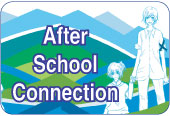AFTER SCHOOL CONNECTION
2014 Spring Term (Feb 5 - May 7, 2014, Wednesdays)
 The RCD, in partnership with SDC Blue Ribbon Foundation, offered a new after school activity for children with special needs – AFTER SCHOOL CONNECTION, The Program which is a partnership with the SDC Blue Ribbon Foundation and the Richmond Centre for Disability is a music therapy program for children with special needs.
The RCD, in partnership with SDC Blue Ribbon Foundation, offered a new after school activity for children with special needs – AFTER SCHOOL CONNECTION, The Program which is a partnership with the SDC Blue Ribbon Foundation and the Richmond Centre for Disability is a music therapy program for children with special needs.
Purpose: To provide affordable and educational after school activities for children with disabilities, focusing on music, drama and movement in addition to games, team work and socialization.
Objectives: To foster creativity, confidence, self-expression, spontaneity and awareness in participants.
Date: Feb 5 - May 7, 2014, Wednesdays, 3:45pm - 5:00pm (No class Mar 19, 26)
Participants: Children with special needs ages 9 to 15 years old
Fee: $40 for the entire term (12 sessions); subsidies are available for families which are low income
Venue: RCD (100-5671 No. 3 Road, Richmond)
Registration: Submit registration form in its entirety before deadline, new applicants need to attend an interview. Space is limited, register early!
For enquires, call Tom at (604) 232-2404 or Email: tom@rcdrichmond.org
Click here to view the After School Connection Poster & Brochure.
For enquires, call Tom at 604-232-2404 or email: tom@rcdrichmond.org
Learn More about the SDC After School Connection
Who is involved?
SDC Blue Ribbon Foundation Volunteers: Volunteers from the SDC Blue Ribbon Foundation will act as a buddy toward each participant. They will be assisting in implementing various activities, serving refreshments, supervising participants, and supporting the participants to take part in activities and providing hands-on assistance as needed.
What is the impact of music for children with disabilities?
- Facilitates relaxation
- Increases motor coordination
- Reinforces and provide motivation for physical exercise
- Fosters independence, self-confidence and self-esteem
- Develops functional speech and communication abilities
- Motivates interaction with others
Music and Children with Autism
Children and adults with autism often have an unusual sensitivity and preference for music. Music can be a very effective motivator to learn non-musical material, to provide positive sensory experiences, decrease self-stimulatory behaviours, improve social behaviours and relationships, enhance motor coordination and improve communication skills. In music therapy sessions, the therapist and participant create music together by singing and playing various instruments and the music is used as a tool to work on various therapeutic goals.
What to expect for the activities?
Movement
- Ice breaker games
- Drama games
- Arts & Crafts
- Movement in place, emphasizing large and small body parts
- Finger plays and small movement
- Free movement
- Imitative or narrative movement: animals, transportation, etc.
Exploring music and language
- Tonality: songs in major, minor, and other tonalities
- Meter: songs and chants in double, triple and asymmetric meters
- Beats: macro beat, micro beat, elongations, diminutions
- Songs without words (sung on neutral syllables)
- Songs with words
- Songs with actions
- Vocal play (siren, swoops), resting-tone play
- Word/sound substitution or variations
- Lullabies (for relaxation)